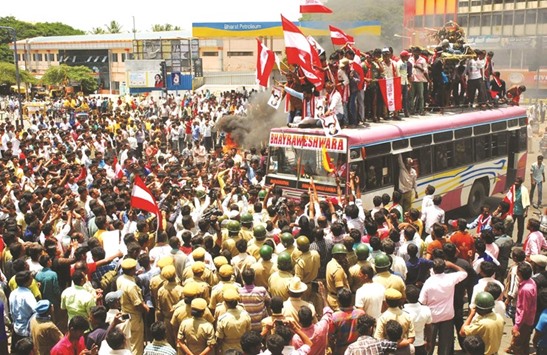Bowing to the Supreme Court order, Karnataka yesterday began releasing Cauvery river water to Tamil Nadu amid massive protests and demonstrations across the Mysuru region.
“We have started releasing water from early today to Tamil Nadu as directed by the Supreme Court despite facing hardship,” Chief Minister Siddaramaiah told reporters here.
Though the apex court on Monday directed the state to release 15,000 cusecs of water daily for 10 days to Tamil Nadu, 10,000 cusecs was let out from the Krishna Raja Sagar (KRS) reservoir as 5,000 cusecs is expected to flow to Biligundlu, the measuring point at the inter-state border, by natural course (gravity) and other sources in the downstream.
“As decided at the all-party meeting on Tuesday, we are soon filing a petition in the apex court for modifying its order to reduce the quantum (15,000 cusecs) to 10,000 cusecs and the number of days to six from 10, which we offered to release on September 5 as a goodwill gesture in response to the apex court’s observation on September 2 to adopt a policy of live and let live,” said Siddaramaiah.
Karnataka has also decided to soon petition the Cauvery Supervisory Committee for sparing the state from releasing more water as the water level in all the four reservoirs across the river basin was 46.8 tmcft (thousand million cubic feet) on Tuesday, which will be barely sufficient even for drinking water supply to Bengaluru, Mandya and Mysuru.
The combined storage of water in Kabini, KRS, Harangi and Hemavathi reservoirs is 114 tmcft while the live storage is 104 tmcft.
The apex court set up the supervisory committee in May 2013 as a pro-tem measure for implementing the Cauvery Water Dispute Tribunal award, which the central government notified in February of 2013 and six years after the tribunal declared the award in February 2007.
The federal Water Resources Secretary is the chairman of the Supervisory Committee while the chief secretaries of Karnataka, Tamil Nadu, Kerala and Puducherry are its members, besides officials from the Central Water Commission.
As 11,000 cusecs is equivalent to 1 tmcft and 15,000 cusecs is 1.36 tmcft, the combined reservoirs’ live storage will decline to 33.2 tmcft after September 16 - from 46.8 tmcft on September 6 if 13.6 tmcft is released in 10 days.
A cusec, which is a measure of flow rate of water per second, is equivalent to a flow of 28.317 litres per second.
“With the southwest monsoon retreating and prospects of more rains in the catchment areas of the reservoirs being bleak, the quantum of water (33.2 tmcft) will be barely sufficient for drinking water supply to Bengaluru, Mandya and Mysuru and very little for irrigation of agricultural fields,” Siddaramaiah said.
According to the tribunal’s final award, Karnataka has to release 192 tmcft of water to Tamil Nadu during a normal year, when the southwest monsoon rainfall is above normal.
“Due to weak rainfall in the catchment areas in the river basin, the four reservoirs have received 114.66 tmcft of water up to August 31 as against a normal flow of 215.7 tmcft, resulting in a deficit of 47.27%,” said Siddaramaiah.
Though the tribunal has provided for sharing of distress without giving the operational method or formula, the state released 33 tmcft of water till August on the basis of proportionality as specified by the tribunal.
“Ignoring the distress conditions, Tamil Nadu has sought 50 tmcft at the Central Water Commission gauge station at Biligundlu, which is applicable in a normal year and not in a distress year,” a water resources department official said.
Meanwhile, the state government has deployed heavy security at the Kabini Dam in Mysuru district amid reports that farmers were planning to lay siege to it.
Prohibitory orders have been clamped by the authorities at the dam site to prevent farmers from assembling in the village.
Buses and trucks from Tamil Nadu heading to Karnataka were stopped at Hosur border.
Vehicular traffic has been hit on Mysuru-Bengaluru expressway as Janata Dal (Secular) activists led by former minister G T Devegowda staged protest at Naganahalli on the outskirts of Mysuru.
The ongoing agitation has also severely affected the state transport bus service.
The Karnataka State Road Transport Corporation (KSRTC) yesterday suspended bus services from Bengaluru towards Mysuru.

People stage a demonstration against releasing of Cauvery river water to Tamil Nadu, in Bengaluru yesterday.
